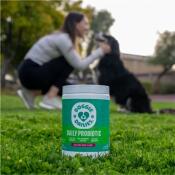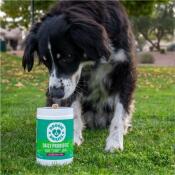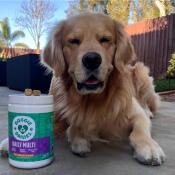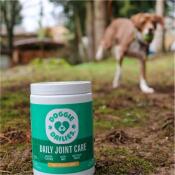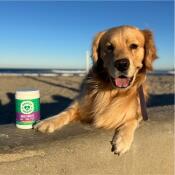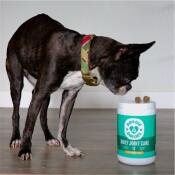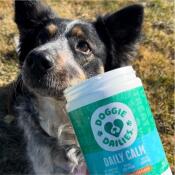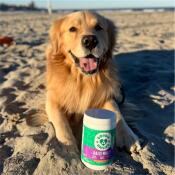Did you know that owning a dog makes you the caretaker of billions of tiny organisms? This diverse collection of microscopic organisms, known as the gut microbiome, plays a critical role in keeping your dog healthy and happy. If the balance of gut bacteria is disrupted, your dog could suffer from serious side effects.
Scientists once looked at your dog’s gut microbiome (and ours too) as a gathering of freeloaders, and even invaders. But, current research shows that this collection of organisms has a profound impact on canine health. In fact, the gut microbiome is so important to your dog’s health that it is often referred to by experts as the “forgotten organ”.
Let’s take a deep dive into the dog gut microbiome and learn what it is, why it is so important, and how you can help restore and support your dog’s microbiome.
The Microbiome & Dog Gut Health
-
What is the Microbiome?
The gut microbiome is a complex collection of different bacteria and other microbes such as viruses and fungi in the gastrointestinal tract. While many different families of bacteria can be found in a dog’s intestinal tract, the vast majority belong to one of five main groups: Firmicutes, Fusobacteria, Bacteroides, Proteobacteria and Actinobacteria. These microorganisms work independently and together in a symbiotic fashion to support and benefit not only each other, but also the host (your dog).
While microbial populations are found in dogs ears, skin, mouth and respiratory tract, the gastrointestinal tract is home to the largest population. According to the Morris Animal Foundation, estimates suggest there are 10 times more organisms in the intestinal tract than total cells in a dog’s body.
-
Why is the Microbiome Important?
Your dog’s gut is made up of about 70% of immune cells, making it the biggest immune organ found in the body. A healthy and balanced microbiome is crucial for your dog’s overall health.
When most people think about the gut, they only think about digestion. But, the microbiome impacts so much more than just digestion. It contributes to metabolic functions, helps ward off dangerous pathogens, regulates the immune system, impacts cognitive function, and affects directly or indirectly many physiologic functions.
“A healthy and stable microbiome can simultaneously act as pro- and anti-inflammatory, keeping a balance to prevent excessive inflammation while still being able to promptly respond to infections,” wrote Dr. Rachel Pilla.
Nearly every aspect of your dog’s health is impacted by the microbiome.
-
Balance is Key!
When the composition of gut bacteria is altered, it changes the way the bacteria interact with each other. As a result, it can have serious consequences to your dog’s overall health.
Many factors can cause an imbalance that is sometimes temporary and other times chronic. Commonly, gut bacteria is disrupted by antibiotics and other medications, infections, chronic stress, and even sudden diet changes.
Imbalance of gut bacteria can lead to inflammatory bowel disease, digestive issues, immune system reactions, and even behavioral issues. Loose stool and diarrhea is often the first signal that something is wrong with the gut microbiome. Rebalancing dog gut bacteria is the to restore gut health for dogs
-
Fiber is Your Friend!
A dog’s diet plays a huge role in maintaining a healthy microbiome. When you feed your dog, you’re also feeding their microbiome. A healthy, balanced diet is the first step to restore gut health for dogs, and fiber plays a big role.
Research shows that high-fiber diets have been associated with increased diversity and number of gut bacteria in people. Since the gut microbiome of a dog is similar to that of a human, dogs can also benefit from high-fiber diets, unless a dog has an underlying disease that precludes the use of a high-fiber diet.
-
Probiotics for a Healthy Microbiome
In addition to fiber, probiotics help to regulate the balance of good and bad bacteria in the gut, which helps:
- Provide protection from viruses, harmful bacteria and pathogens6
- Form a protective barrier in your dog’s gut, defending against toxins, drugs, allergens, and carcinogens
- Contribute to overall microbiome health
- Aid digestion
- Foster a good mood
- Boost immune system
-
Steps to a Healthy Microbiome
There are many steps dog owners can take to keep their pup’s microbiome balanced or to restore balance:
- Give your dog a probiotic supplement that offers a variety of strains of beneficial bacteria.
- Nourish those “good guy” bacteria with a prebiotic supplement.
- Monitor your dog’s weight, the condition of his coat, his energy level, and the quality of his daily stool for signs that his diet needs adjusting. What works well for some dogs may not benefit other dogs in other circumstances.
- Avoid overuse of antibiotics
Wrap up
The gut microbiome plays a critical role in achieving a healthy gut for dogs but also contributes to a healthy immune system, shiny coat, healthy skin, and more. And diet plays a huge part in keeping gut bacteria for dogs balanced.
Feed your dog a healthy, veterinarian-approved diet and boost it with a high-quality dog probiotic supplement, like Doggie Dailies Advanced Probiotics Supplement for Dogs. For specific information on probiotics and their role in your dog’s health, check out the Doggie Dailies blog post on what most dog parents don’t know about probiotics.
References
-
-
- Pilla, R., & Suchodolski, J. S. (2020). The Role of the Canine Gut Microbiome and Metabolome in Health and Gastrointestinal Disease. Frontiers in Veterinary Science, 6(498), 1–12. https://doi.org/10.3389/fvets.2019.00498
- The Amazing World of the Canine Gut Microbiome. (2020, May 26). Morris Animal Foundation. https://www.morrisanimalfoundation.org/article/amazing-world-canine-gut-microbiome
- Dodds, W. J., DVM. (2021, January 1). The Gut: The Key to Dog Health. The Bark. https://thebark.com/content/gut-key-health
- Coelho, L. P., Kultima, J. R., Costea, P. I., Fournier, C., Pan, Y., Czarnecki-Maulden, G., Hayward, M. R., Forslund, S. K., Schmidt, T. S. B., Descombes, P., Jackson, J. R., Li, Q., & Bork, P. (2018). Similarity of the dog and human gut microbiomes in gene content and response to diet. Microbiome, 6(1), 1–11. https://doi.org/10.1186/s40168-018-0450-3
- Schmitz, S., & Suchodolski, J. (2016). Understanding the canine intestinal microbiota and its modification by pro‐, pre‐ and synbiotics – what is the evidence? Veterinary Medicine and Science, 2(2), 71–94. https://doi.org/10.1002/vms3.17
- Manucy, T. D. (2020, November 3). Probiotics for Dogs: Do They Work? PetMD. https://www.petmd.com/dog/general-health/probiotics-dogs-what-you-need-know
-

